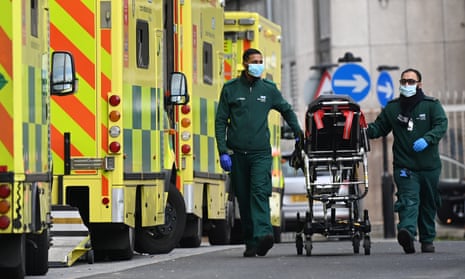Prof Andrew Hayward, a member of the UK government’s Scientific Advisory Group for Emergencies (Sage), has said society will have to live with a degree of mortality that will be “substantial”, but added that we will “get back to normal”.
He told Times Radio: “I think, you know, given the societal trade-offs, we are going to have to live with a degree of mortality that will be substantial … it will get less over time as more people get vaccinated and as more people get immune, and I do believe that we’ve been through the worst of this.”
Hayward said he did not think new variants of Covid-19 would completely evade vaccine-related immunity. “The vaccines will still take the sting out of it, if you like, and reduce the case fatality rates,” he said.
“Of course, we have the technology to update the vaccines and I think that’s where we’re going really, a situation that will be much more like flu, the numbers of deaths will be much more like flu, the approach to surveillance of new strains and development of new vaccines and regular annual vaccinations will be like that. And we will get back to normal.”
Looking back on the beginning of the pandemic, Hayward, a professor of infectious disease epidemiology at UCL, said: “I think one of the reasons that we’ve had so many deaths is that we left things far too late, in terms of taking more restrictive measures.
“We should have been taking social distancing measures – if not a full lockdown then other measures that were trying to separate people – much earlier. At that time, of course, we also didn’t really have the same mechanisms to measure how much disease there was in the community, so we were largely only really seeing the tip of the iceberg of cases.
“By the time you start to see major increases in deaths then it was really too late to take action, and hence the levels got extraordinarily high before we took effective action, and it took a long, long time for them to go back down again.”
Asked if he thought epidemiologists did not really have the ear of government in early March last year, Hayward said: “The concept, you know, the political concept of going into lockdown and doing something like that seemed so extraordinary …
“Also, I think there was conflicting advice … there was some advice if you go too early then people will get tired of it, but it did seem to be fairly inevitable that we would need to do something like that at some stage. I think the timing of it was something that they were getting conflicting advice on.
“However, I think we didn’t learn our lesson from that and we didn’t really learn the lesson that lockdowns are going to be way, way more effective if you start them earlier.”
Hayward said it was much easier to put out a very small fire than put out a big forest fire. “When it came to the following autumn, we didn’t learn that lesson,” he said.
